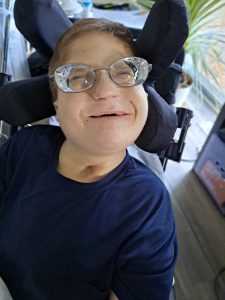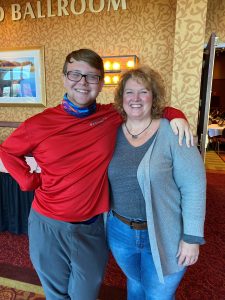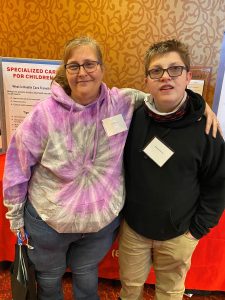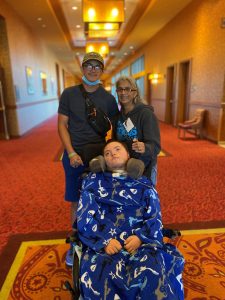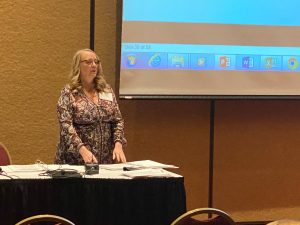Transition Conference Prepares Youth With Disabilities for Adulthood
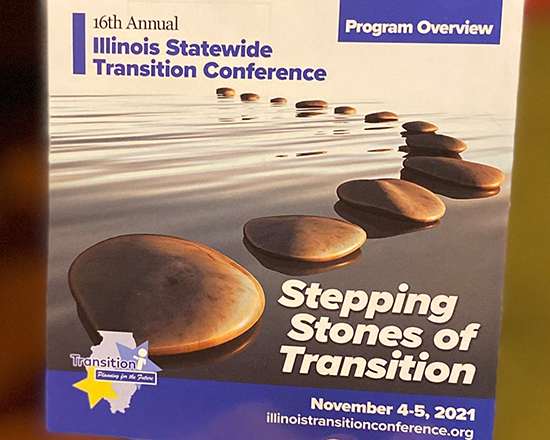
Families and professionals came together in person and virtually at the annual Stepping Stones of Transition Conference in East Peoria to improve outcomes for transition-age youth with special needs
As a single parent raising a child with complex medical needs, Kristen Fisher says it’s easy to feel isolated.
The feeling subsided as she walked through the East Peoria Riverfront Conference Center and saw dozens of other parents and youth with similar needs.
“Seeing everyone at the conference and meeting other parents, it helps confirm that I’m not alone,” Kristen said.
The Illinois Statewide Transition Conference, titled “Stepping Stones of Transition,” returned for its 16th year on Nov. 4-5 in East Peoria after a one-year absence due to the COVID-19 pandemic.
More than 660 families and professionals gathered in-person and virtually to gain skills, resources and information to help youth with disabilities prepare for adulthood.
The University of Illinois Chicago’s Division of Specialized Care for Children (DSCC) is a conference sponsor and served on its steering committee.
DSCC covered the conference-related expenses for 33 of our participant family members across the state.
A “Phenomenal” Experience
Kristen is the mother of DSCC participant Connor Fisher, who will soon turn 15 years old. He was born prematurely with profound delays and a “smile that will melt your heart,” she said.
This year’s conference was Kristen’s first and she called the experience “phenomenal.”
“It’s hard to grasp that my baby is not a baby. He’s growing up. It’s a scary transition,” she said.
Kristen particularly enjoyed the breakout session “SSI, SSDI, HFS: Understanding the Alphabet Soup of Government Benefits.” She gained a better understanding of available government benefits and how they change over the lifetime.
DSCC mom Amy also learned helpful information during the breakout session on government benefits. She said financial planning is an important part of preparing for her daughter Jaida’s future. Jaida, 17, has been a DSCC participant since just after birth.
Eighteen-year-old DSCC participant RJ Smith attended the conference with his mom, Karla. It was the first time attending for both.
RJ is a senior in high school who plays the baritone in his high school band. He wants to go to culinary school after graduation to become a baker.
He picked all the conference breakout sessions that he and Karla attended.
One of their favorites was about the Fast Track Transition Program through the Illinois Department of Human Services’ Division of Rehabilitation Services. The program provides pre-employment transition services to students with disabilities.
RJ said he is ready for more independence, and Karla said the session helped open her eyes to more options to help achieve that.
“I want to help him become more independent and push him toward that but not just leave him sitting the middle of the road, stranded,” Karla said. “(The conference) overall has been helpful.”
Preparing for Life After Graduation
The conference consisted of informative breakout sessions in the areas of:
- Employment
- Education
- Community
- Health Care
DSCC participant Michael Rounds, 15, said he enjoyed the breakout session on the Culture of Coordinated Support Model. This model is where people with disabilities, families, supporters, agencies and service providers work together to develop and implement consistent support plans with unified goals and services provided by the provider best suited to do so.
Michael said the session made him think about getting more involved with his Individualized Education Program (IEP) at school. He also liked learning more about what choices are available to him as he plans for his future.
His mother, Lori, said the conference helped her know where to start in preparing Michael for life after high school graduation.
Rosa Menard, mom to 17-year-old DSCC participant Jacob, said the amount of information to soak up over the two-day conference was almost overwhelming. She took many notes about potential resources and programs to discuss during Jacob’s next IEP meeting.
Jacob is non-verbal and she wants to set him up for success after high school.
Rosa encouraged other families to start the transition planning process as soon as possible.
“Start asking those questions now,” she said.
Improving Outcomes
Nearly 40 DSCC staff members attended the conference in-person or virtually to network, learn from others and strengthen their skillsets and tools to serve our families.
DSCC also sponsored the conference’s health care track for providers who play a role in the transition from the pediatric to adult healthcare system and those who build youth’s capacity and healthcare skills to prepare for adulthood.
DSCC Transition Specialist Darcy Contri said attending providers found helpful tips and information they will apply in their own practices and interactions with youth and families. These changes include:
- Starting the transition planning process sooner with patients and families
- Making sure the youth and their family are included in all decision-making and planning
- Keeping a holistic view of the patient and noting environmental barriers for their family
- Emphasizing self-determination when working with youth and families on transition goals
- Discussion of self-management strategies with youth and families
Darcy has been involved with planning the conference for the last 16 years.
“Every year it has been exciting to see the positive impact the transition conference has on improving outcomes for Illinois transition-age youth and their families,” she said.
Visit our Facebook page to see more photos from this year’s conference.



